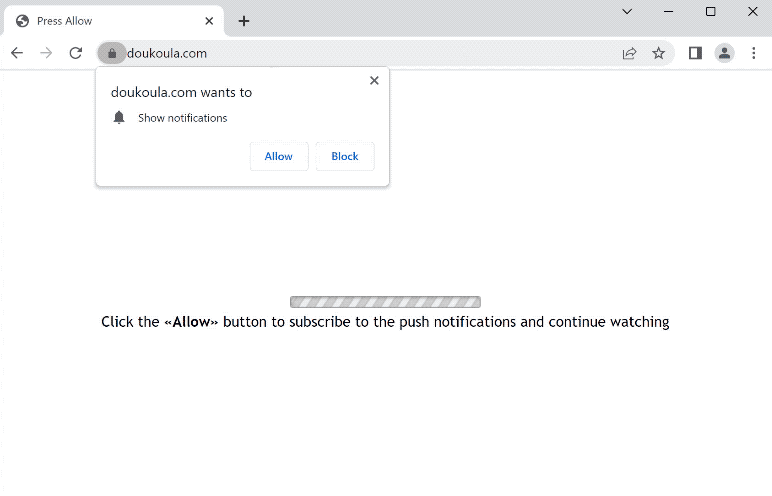doukoula.com is a generic deceptive website that has no content but tries to trick users into allowing ads on their desktops. To do that, it misuses a legitimate browser feature that allows sites to ask for permission to show notifications. Legitimate sites show useful notifications while sites like doukoula.com spam ads.
When you end up on doukoula.com, a message will prompt you to click “Allow” to continue watching. It’s referring to the browser notifications saying “doukoula.com wants to show notifications” that pops up immediately upon you entering the site. If you click “Allow” on the “doukoula.com wants to show notifications” alert, the site will start displaying notifications directly on your desktop. Those notifications will mostly be spam ads. Interacting with these ads could expose you to harmful content like scams and malware, so it’s best to not interact with them and remove the permission as soon as possible.
The “show notifications” feature is generally safe as long as only legitimate sites get permission to show content. In some cases, you may even find the feature to be useful. For example, when you want to see important news updates from a favored news website without having to visit the site, you can give it permission.
You can easily revoke a site’s permission to show notifications in your browser’s settings. It’s important to remove doukoula.com from the list of sites with permission as soon as possible. If you need help, you can use the instructions provided at the end of this report.
What triggers redirects to sites likedoukoula.com
Users may find themselves redirected to websites like doukoula.com if they don’t have an adblocker program installed or enabled while browsing high-risk websites. This is because some websites try to expose users to a large amount of advertising content, essentially bombarding them with ads and triggering redirects regardless of what they click on. Notably, sites that have pornographic or pirated content are especially notorious for this behavior, as they continuously trigger redirects regardless of what users click on. Thankfully, these redirects can be effectively blocked with a reliable adblocker program.
However, being randomly redirected could also indicate that your computer is infected with adware. While these types of infections are not inherently dangerous, the ads they expose users to can be quite troublesome. Adware and similar infections often get installed onto computers through a method known as software bundling. Essentially, adware and other unwanted programs are bundled with free software as additional offers and are authorized to be installed without explicit user permission. This method is generally frowned upon, and it’s not uncommon for programs that use it to be flagged as potential threats by anti-virus programs.
When installing a program, opt for Advanced (Custom) settings instead of Default settings. This will enable you to view and deselect any additional offers that may be bundled with the program. By choosing the Default settings, these offers are automatically installed without user consent. It’s recommended to avoid installing these additional offers, even if they may seem useful, as they can clutter your computer with junk. Furthermore, these unwanted programs can be quite difficult to remove once fully installed. Therefore, it’s best to prevent these unwanted programs from installing in the first place.
How to stop doukoula.com redirects
We highly recommend running an anti-virus scan on your computer if you are frequently redirected to websites like doukoula.com, as adware could be the trigger. Adware infections can be challenging to remove manually, so using an anti-virus program is the best and easiest option. It’s also important to install an adblocker program if you want to avoid seeing ads and being redirected.
If you are seeing notifications by doukoula.com, it’s easy to revoke its permission in your browser settings. If you need help removing doukoula.com from the list of sites with permission, we have provided instructions below. You can also disable this feature if you prefer not to receive future notification requests.
- Mozilla Firefox: Open the menu (the three bars at the top-right corner), click Options, then Privacy & Security. Scroll down to Permissions, press Settings next to Notifications, and remove doukoula.com and any other questionable websites from the list. It’s possible to permanently turn off push notification requests by checking the “Block new requests asking to allow notifications” box in the same Notifications settings.
- Google Chrome: Open the menu (the three dots top-right corner), then Settings, then Privacy and security, then Site Settings. Click on Notifications under Permissions, and remove doukoula.com and any other questionable websites from the list. It’s possible to permanently turn off push notification requests by toggling off “Sites can ask to send notifications”.
- Microsoft Edge: Open the menu (the three dots top-right corner), then Settings, then Cookies and site permissions, then Notifications. Review which sites have permission and remove doukoula.com and any other questionable websites from the list. It’s possible to permanently turn off push notification requests by toggling off “Ask before sending”.
Site Disclaimer
2-remove-virus.com is not sponsored, owned, affiliated, or linked to malware developers or distributors that are referenced in this article. The article does not promote or endorse any type of malware. We aim at providing useful information that will help computer users to detect and eliminate the unwanted malicious programs from their computers. This can be done manually by following the instructions presented in the article or automatically by implementing the suggested anti-malware tools.
The article is only meant to be used for educational purposes. If you follow the instructions given in the article, you agree to be contracted by the disclaimer. We do not guarantee that the artcile will present you with a solution that removes the malign threats completely. Malware changes constantly, which is why, in some cases, it may be difficult to clean the computer fully by using only the manual removal instructions.
